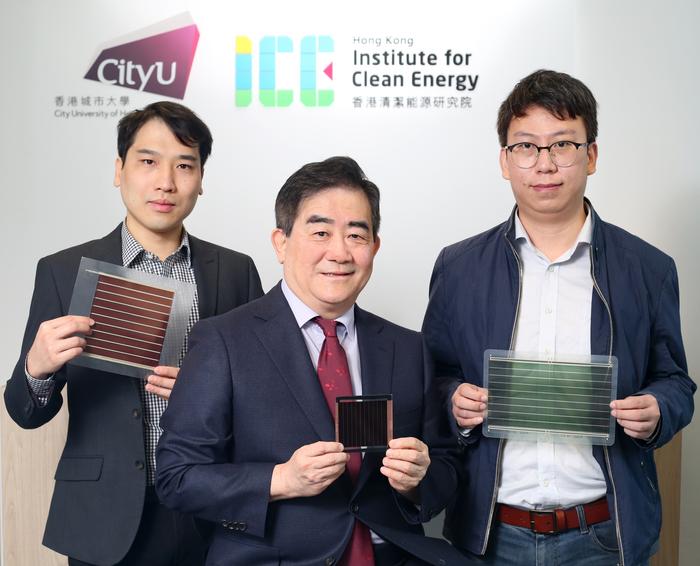As climate change continues to advance, the need for low-carbon, clean energy alternatives has become more urgent than ever. A research team at City University of Hong Kong (CityUHK) has developed a new generation of printable perovskite solar cells that offer higher efficiency and stability, lower cost and scalability, with a minimal carbon footprint. With funding support from the inaugural Research, Academic and Industry Sectors One-plus Scheme (RAISe+ Scheme) of the Innovation and Technology Commission of the HKSAR government, the team aims to establish a pilot production line within one and a half years, paving the way for a sustainable solar future.

Credit: City University of Hong Kong
As climate change continues to advance, the need for low-carbon, clean energy alternatives has become more urgent than ever. A research team at City University of Hong Kong (CityUHK) has developed a new generation of printable perovskite solar cells that offer higher efficiency and stability, lower cost and scalability, with a minimal carbon footprint. With funding support from the inaugural Research, Academic and Industry Sectors One-plus Scheme (RAISe+ Scheme) of the Innovation and Technology Commission of the HKSAR government, the team aims to establish a pilot production line within one and a half years, paving the way for a sustainable solar future.
Solar energy presents a feasible solution to sustainably meeting the future terawatt-scale energy demands of global society. While silicon-based solar technologies currently dominate global photovoltaic market, they face challenges, such as high production costs and limited flexibility in product applications.
Professor Alex Jen Kwanyue, Lee Shau Kee Chair Professor of Materials Science at CityUHK, has been a pioneer in developing perovskite solar cells, which are considered a promising technology to replace the current silicon-based solar cells. He and his research team at CityUHK have achieved significant milestones in recent years. Notably, the perovskite solar cells they achieved remarkable power conversion efficiency of over 26% in laboratory testing. They also successfully addressed the common stability issues by demonstrating perovskite solar cells with an estimated lifetime of over 20 years through accelerated aging tests, comparable to that of silicon-based cells in the market.
“More importantly, the new-generation perovskite solar cells are manufactured from perovskite precursor inks, which can be easily coated and ‘printed’ on a substrate to form thin polycrystalline perovskite films with a processing temperature as low as 100°C,” explained Professor Jen. “This enables rapid mass production of the perovskite solar cells, like printing newspapers. This significantly reduces energy consumption and production costs compared to those for manufacturing traditional silicon solar cells, which require high-temperature processes at over 1,000°C and significantly more processing steps. The final comparable cost of energy for perovskite solar cells can be just half that of silicon polar cells.”
Furthermore, perovskite solar cells are less dependent on incident angles and light intensity and have superior mechanical flexibility, making them easily integrable into various applications, including building-integrated photovoltaics (BIPVs) (such as semi-transparent solar cells for skyscraper windows), and powering indoor Internet-of-Things (IoT) sensors and wearable electronics.
Professor Jen has also teamed up with Professor Angus Yip Hin-lap, Associate Director of the Hong Kong Institute for Clean Energy at CityUHK. Combining the edges of functional materials development and solar cell device engineering, the collaborative research team has established a spin-off company, HKTech Solar Limited, which is managed by Dr Francis Lin from the team. The company has also formed strategic partnership with Towngas Energy Academy to develop commercial-oriented perovskite solar products. Taking advantage of the vast fundamental knowledge and research expertise accumulated by the team combined with commercial acumen from industry, the team expects to expedite the development and commercialisation of this promising photovoltaic technology.
The team is also collaborating with an industry partner and investor, Abes Technology Group, to develop BIPV products that integrate perovskite solar cells, including solar tile decking, solar water floating decks and exterior wall panels.
With the RAISe+ funding, the research team plans to set up a pilot production line with annual capacity of 20 MW within one and a half years. They aim to introduce the revolutionary solar cell products to Abes Technology Group and Towngas Energy Academy for pilot usage and application trials.
In the longer term, the team will focus on developing and manufacturing new-generation perovskite solar panels to provide scalable, low-cost electricity for both centralised and distributed applications, including power grids, smart cities, IoT sensors and wearables, to offer diverse perovskite solar products in different configurations and form factors (rigid or flexible).
“The RAISe+ funding is a ‘shot in the arm’ for the team,” said Professor Jen. “It will facilitate the development of these technologies and speed up the commercialisation progress, thereby strengthening Hong Kong’s role in the clean energy market and contributing to a global clean-energy future.”
https://www.cityu.edu.hk/hktech300/media/latest-news/scalable-production-next-generation-high-performance-printable-solar-cells




